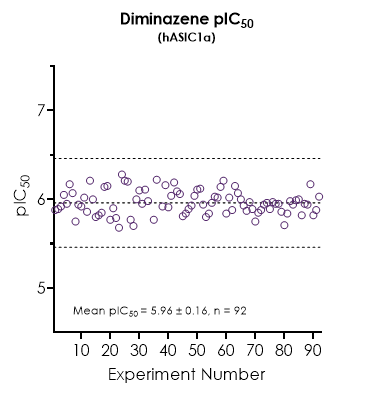Recording and Q&A from webinar 'Recent Progress Towards a Potential Treatment for KCNC-1 Related Disorders'
We understand the importance of robust, reliable assays in enabling you to make timely, well-informed decisions. Using innovative solutions tailored to your specific target, we focus on rapid delivery of high-quality data to accelerate your early-stage compound screening and lead optimisation programmes.
Our specialist team of ion channel scientists are experts in their field. With over 250 years’ collective ion channel drug discovery experience, we specialise in developing, optimising and validating high-quality ion channel screening services using a range of electrophysiology and fluorescence-based platforms.
We fully customise ion channel assays at different stages of the screening cascade, from high-throughput screening (HTS) and structure-activity relationship (SAR) studies, through to specialised biophysical and mechanism-of-action studies for lead compounds.

Figure 1. Figure 1. Example recording of hASIC1a inward current recorded on the Sophion Qube automated electrophysiology platform. Cells are held at -60 mV with ASIC1a activated by the addition of extracellular solution buffered to pH 6.3 (black trace). The effect of inhibitor, diminazene, at 100 nM and 30 µM on the inward current is displayed in the blue and red traces, respectively.

Figure 2. Diminazene concentration-response curve displaying an IC50 of 1.13 µM (pIC50 = 5.95).

Figure 3. The pIC50 values of the reference compound, diminazene, against ASIC1a included in the Qube experiments when supporting Medicinal Chemistry Hit-to-Lead activities.
Our expertise in electrophysiology and fluorescence-based assays stands us apart, guaranteeing robust and reliable data.
We strive to exceed our clients’ expectations and to build long-term partnerships based on trust:
High quality, cost-efficient compound screening.
Rapid reporting and data interpretation by experienced ion channel experts.
Tailored, target-focussed assay development, including complex assays.
Detailed characterisation of lead compounds in a range of complementary assays.
Translational services including confirmation of efficacy.
Access to commercially available compound libraries (Assay.Works and Enamine) with freedom to operate.
Recording and Q&A from webinar 'Recent Progress Towards a Potential Treatment for KCNC-1 Related Disorders'
This webinar presents the patient perspective, electrophysiological research, and technologies used as we work towards a potential treatment for KCNC1-related disorders.